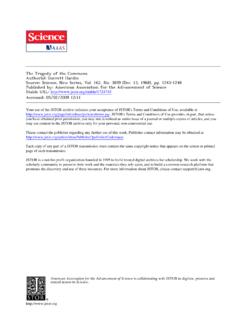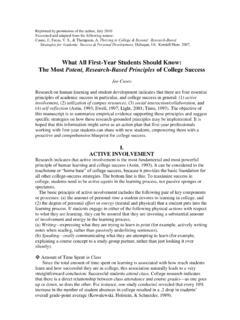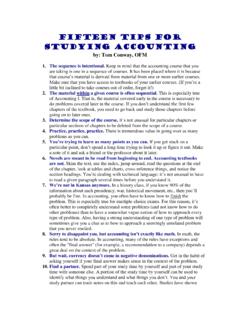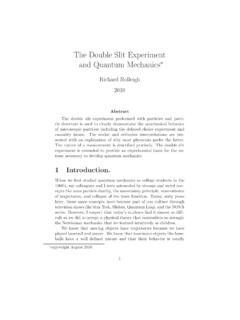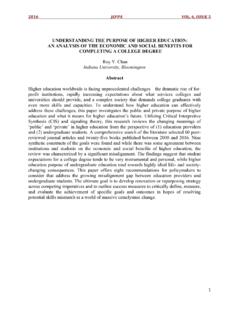Transcription of Education and Income Inequality: A Meta-Regression Analysis
1 1 Education and Income Inequality: A Meta-Regression Analysis Abdul Jabbar Abdullah* Hristos Doucouliagos Elizabeth Manning - FIRST DRAFT - Please do not quote without permission from the authors September 2011 Abstract This paper revisits the literature that investigates the effects of Education on inequality. Specifically, the paper provides a comprehensive quantitative review of the extant econometrics literature through a Meta-Regression Analysis of 64 empirical studies that collectively report 868 estimates of the effects of Education on inequality.
2 We find that Education affects the two tails of the distribution of incomes; it reduces the Income share of top earners and increases the share of the bottom earners, but has no effect on the share of the middle class. Inequality in Education widens Income inequality. Education has a larger negative effect on inequality in Africa. The heterogeneity in reported estimates can be largely explained by differences in the specification of the econometric model. JEL Codes: I24, C01 Keywords: Education , inequality, Meta-Regression Analysis Number of words: 12,683 * Corresponding author. Abdullah: Universiti Teknologi Mara Sarawak Campus, Malaysia and PhD Candidate Deakin University, Doucouliagos: School of Accounting, economic and Finance, Deakin University, Manning: School of Accounting, economic and Finance, Deakin University, 2 Education and Income Inequality: A Meta-Regression Analysis 1.
3 Introduction Income inequality is a critically important social, political and economic issue in the study of economic development. Inequality can affect economic growth and development and it can impact upon political stability and class and ethnic The empirical literature identifies various factors that shape inequality, such as urbanization, the level of development, political regime, government intervention and land inequality. While these are all important factors, it is Education that often occupies the centre stage. A large theoretical and empirical literature has explored the effects of Education on inequality.
4 Some studies look at the effects of Education on individual earnings while others look at the effects on the aggregate (national) distribution of Income . The aim of this paper is to revisit this later body of evidence through a quantitative literature review (Stanley, 2001). Specifically, this paper provides a comprehensive review of the extant econometrics literature through a Meta-Regression Analysis (MRA) of 64 empirical studies that collectively report 868 estimates of the effects of Education on aggregate inequality. The aims of our MRA are twofold: (1) Assess the effect of Education on inequality.
5 Does Education increase, decrease, or have no effect at all on inequality at the national level? Under what conditions does Education shape national inequality? (2) To model the heterogeneity in the empirical estimates. What factors explain the wide variation in the reported estimates of the effect of Education on inequality? We show in this paper that Education is an effective mechanism for reducing inequality. We also show that it is possible to explain most of the variation in the reported estimates. The paper is organized as follows. Section 2 presents a review of the main theoretical arguments.
6 Section 3 presents a brief discussion of the meta- Analysis data. The results and Analysis of the effect of Education on inequality are presented in section 4. Conclusions are drawn in section 5. 1 For example in Malaysia, inequality directly resulted in ethnic tensions between Malays and Chinese (Faaland , 1990). 3 2. Theoretical Background and Prior Evidence Education is widely seen as one of the most efficient ways to reduce inequality (Toh, 1984). Education provides greater economic opportunities, especially to the poor (Blanden and Machin, 2004).
7 2 It determines occupational choice and the level of pay and it plays a pivotal role as a signal of ability and productivity in the job market. Education shifts the composition of the labour force away from unskilled to skilled. While this process may very well initially increase Income inequality (Chiswick, 1968), in the long term it is expected to reduce Income inequality (Schultz, 1963). Educational attainment plays a key role as a signal of ability and productivity in the job market; Education is an effective signal of achievement. The selection and assessment process inherent in the Education system indicates that individual performance has been determined before workers.
8 Will be selected into the occupational structure in which their particular educational background will be most productively employed (Tan, 1982:26). Although Education may not necessarily always produce an accurate signal of labour productivity, limited information compels employers to use Education as the main indicator. Stiglitz (1973:136) argues that: It is often difficult for the employer to identify who will be a good employee; however, firms have observed that the qualities which lead to success in school are related to the qualities which make the individual more productive on the job.
9 Although the correlation may be imperfect, competitive firms can use this information and offer the individuals who do well in school and complete more years of schooling the better jobs. Better educated individuals are perceived to be better able to cope with technological and environmental changes that directly influence productivity levels. Thus, at the macro level, human capital is an important determinant for labor productivity and eventually economic growth (Tsu-Tan Fu , 2002). Individuals with higher Education are rewarded with higher earnings as payment for their productivity and ability (Knight and Sabot, 1990).
10 Demand for higher Education has grown tremendously and experienced rapid changes in past decades. This has been partly driven by the link between Education and socioeconomic status; more highly educated individuals are more likely to gain better employment. The expansion of higher Education increases the supply of higher educated workers into labour markets. This changes the composition of the labour force, as unskilled 2 It should be noted that poverty and inequality are quite distinct processes. 4 workers move into the skilled workers cohort.
